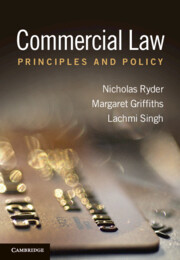Book contents
- Frontmatter
- Contents
- Preface
- List of abbreviations
- Table of Statutory Provisions
- Table of Cases
- Part 1 Agency
- Part 2 Sale of Goods and Services
- Part 3 International Trade and Sales
- Part 3 Chapter 1 Standard Trade Terms
- Part 3 Chapter 2 The Vienna Convention on the International Sale of Goods 1980 (CISG)
- Part 3 Chapter 3 Payment in International Sales
- Part 3 Chapter 4 Carriage of Goods by Sea
- Part 4 Tortious Liability for Defective Products
- Part 5 Unfair Commercial Practices
- Part 6 Banking and Finance Law
- Part 7 Consumer Credit
- Bibliography
- Index
- References
Part 3 Chapter 2 - The Vienna Convention on the International Sale of Goods 1980 (CISG)
from Part 3 - International Trade and Sales
Published online by Cambridge University Press: 05 August 2012
- Frontmatter
- Contents
- Preface
- List of abbreviations
- Table of Statutory Provisions
- Table of Cases
- Part 1 Agency
- Part 2 Sale of Goods and Services
- Part 3 International Trade and Sales
- Part 3 Chapter 1 Standard Trade Terms
- Part 3 Chapter 2 The Vienna Convention on the International Sale of Goods 1980 (CISG)
- Part 3 Chapter 3 Payment in International Sales
- Part 3 Chapter 4 Carriage of Goods by Sea
- Part 4 Tortious Liability for Defective Products
- Part 5 Unfair Commercial Practices
- Part 6 Banking and Finance Law
- Part 7 Consumer Credit
- Bibliography
- Index
- References
Summary
Introduction and background
Due to the effects of increased trade amongst states in the late twentieth century, the need for a harmonised instrument of international sales law was expressed. It was envisaged that a harmonising measure would increase international trade, promote fairness and reduce the negotiation cost of transactions.
In 1929, Ernst Rabel working with the International Institute for the Unification of Private Law (UNIDROIT), sought to establish a uniform law governing transactions of sale. This resulted in two Hague Conventions in 1964: the Uniform Law for the International Sale of Goods (ULIS), and the Uniform Law on the Formation of Contracts for the International Sale of Goods (ULF). These Conventions came into force in 1972, but they had limited success as uniform law, because they were generally considered too wide-ranging in scope and thought to favour industrialised nations. They were therefore only ratified by nine countries, predominately European nations.
The failure of these Conventions led to the recognition that more ef ort was needed to create a uniform sales law that could be applied in all states regardless of their legal, social or economic backgrounds. In 1966, the General Assembly of the United Nations established the United Nations Commission on International Trade Law (UNCITRAL). h is working group sought to review ULIS and ULF in order to create a new Convention, and the result of their efforts were completed in 1978. The UN Convention on Contracts for the International Sale of Goods (CISG) was signed in Vienna in 1980, and came into force in 1988 upon gaining the required number of ratifications. As of 1 August 2011, UNCITRAL reports that seventy-seven states have adopted the CISG.
- Type
- Chapter
- Information
- Commercial LawPrinciples and Policy, pp. 197 - 214Publisher: Cambridge University PressPrint publication year: 2012



